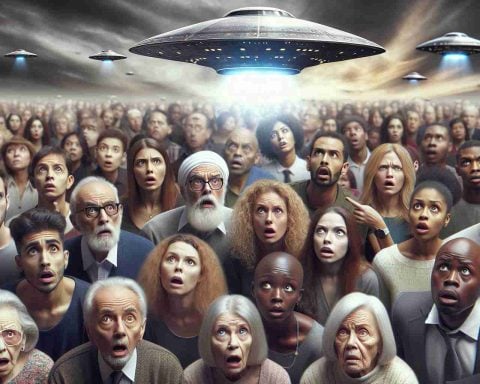Discover the New Documentary Transforming UFO Beliefs
A captivating documentary titled ‘I Want to Believe’ is set to delve into the enigmatic life of Billy Meier, a Swiss national whose extraordinary claims date back to his childhood. Born in 1937, Meier asserts he has been in contact with extraterrestrial beings since he was just five years old, making headlines with his intriguing photographic evidence of unidentified flying objects (UFOs) from the 1970s. These striking images, taken against the breathtaking Swiss landscape, sparked widespread media attention and passionate debates around alien encounters.
Directed by Julio Rojas and Miguel León, the film embarks on an international journey across diverse countries including the United States, Mexico, and Italy, collecting compelling testimonies that challenge the boundaries of truth and belief in today’s uncertain world. The filmmakers present an innovative blend of journalistic investigation and fictional narrative that reexamines our understanding of reality.
With cinematography by Carlos Muñoz Gómez-Quintero, the documentary enhances its narrative with stunning visuals. It explores Meier’s life, revealing not only his controversial claims but also the universal human quest for answers amid the unknown. Produced by Máquina Vega, this documentary aims to transcend typical UFO lore, inviting audiences to rethink their perceptions of reality and the mysteries beyond our world.
The Implications of UFO Beliefs in Contemporary Society
The fascination with Unidentified Flying Objects (UFOs) and extraterrestrial life extends far beyond niche communities; it reverberates through the fabric of society and culture, often influencing public discourse and scientific inquiry. The documentary ‘I Want to Believe’ not only sheds light on Billy Meier’s extraordinary claims but also highlights a burgeoning acceptance of phenomena traditionally relegated to the realm of conspiracy. This evolving mindset may significantly impact how future generations approach science, skepticism, and belief systems.
As sightings gain prevalence and the government releases previously classified files, a culture of transparency emerges surrounding UFO phenomena. This shift could potentially lead to greater international cooperation in addressing the vast unknowns of our universe, aligning with a global economy that increasingly values collaborative scientific pursuits. Moreover, these narratives foster a unique blend of awe and fear that urges societal reflection on humanity’s place in the cosmos.
From an environmental perspective, the question of extraterrestrial technology invites speculation about sustainable advancements. If technologies were to emerge from these interactions, they could hold transformative potential for addressing acute global challenges, including climate change. The long-term significance lies in whether this cultural shift will inspire action towards planetary stewardship, steering society towards improved scientific literacy and greater openness to the unknown. In a world grappling with substantial challenges, the allure of UFOs may just be the catalyst for profound societal change.
Unlocking the Secrets of UFOs: How ‘I Want to Believe’ Transforms Perspectives
The Fascinating Journey into UFO Beliefs
The documentary ‘I Want to Believe’ sheds light on the extraordinary life of Billy Meier, a Swiss national whose claims of extraterrestrial contact have spanned decades. From his assertion of encounters with alien beings since the tender age of five to proclaiming the authenticity of UFO photographs taken in the 1970s, Meier’s story continues to ignite debate and intrigue related to the existence of extraterrestrial life.
Key Features of ‘I Want to Believe’
– Innovative Storytelling: The film combines journalistic investigation with a fictional narrative, challenging viewers to reconsider the boundaries between fact and fiction in the realm of UFOs.
– International Scope: Filmmakers Julio Rojas and Miguel León take audiences on a worldwide journey, collecting testimonies from diverse cultures, which enrich the narrative and explore global perspectives on UFO phenomena.
Use Cases and Audience Insights
‘I Want to Believe’ targets a wide array of viewers, from UFO enthusiasts and skeptics to academic scholars interested in the sociology of belief. By presenting contrasting viewpoints and engaging narratives, the documentary stimulates critical thinking regarding what constitutes credible evidence in the field of ufology.
Pros and Cons of the Documentary
# Pros:
– Engaging cinematography that enhances the storytelling experience.
– An international array of perspectives, lending depth to the subject matter.
– Encourages dialogue about belief and evidence in a post-truth society.
# Cons:
– Some critics may argue that the blend of fictional narrative with documentary elements blurs the line between reality and spectacle.
– Meier’s controversial past may lead to skepticism regarding the validity of the film’s claims.
Pricing and Availability
The documentary is expected to be available on various streaming platforms shortly after its release. While specific pricing details have yet to be announced, documentaries of this nature typically range from $4.99 to $14.99 for digital rentals and purchases.
Trends and Market Analysis in UFO Documentaries
With the growing interest in UFOs and extraterrestrial life, fueled by recent government disclosures and media coverage, ‘I Want to Believe’ enters a burgeoning market. As more viewers seek answers about unidentified aerial phenomena (UAP), films like this can capitalize on public curiosity, feeding into wider cultural conversations about humanity’s place in the universe.
Predictions for Future UFO Documentaries
Given the increasing public interest and scientific developments in the exploration of unidentified aerial phenomena, we can expect a trend of more comprehensive documentaries that not only explore personal narratives like those of Billy Meier but also incorporate scientific theories, government insights, and technological advancements in space exploration.
Conclusion
‘I Want to Believe’ is poised to challenge long-held beliefs and invite viewers to question their perceptions of reality. By combining personal stories with broader cultural insights, it hopes to unlock new discussions about humanity’s quest for answers in the cosmos. To stay updated about this and other documentaries, check out Documentary Network.



















